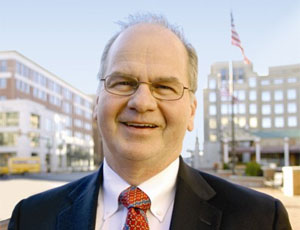Alyeska Pipeline CEO Kevin Hostler will retire from management of the 800-mile Trans Alaska Pipeline System (TAPS) in September, three months earlier than planned. “Retiring at the end of September is good for the pipeline,” Hostler, 55, said in a statement.

Hostler announced on July 7 that his last day is September 30. Members of the TAPS Owner Committee are now looking for a new CEO and will appoint an interim CEO if the position is not filled in time. Hostler’s announcement will not alter controversial staffing or maintenance funding plans, according to Alyeska Corporate Communications Director Michelle Egan.
Hostler, a former vice president of human resources for London-based BP Exploration and Production, the 80% stakeholder in TAPS, has been in his position since 2005. His decision comes after a spill at a pump station and a scathing ombudsman report that showed employees were concerned about the safety implications of cost-cutting efforts and a negative corporate culture.
On May 25, Pump Station 9 spilled as much as 212,000 gal from an overflowing holding tank into a secondary containment area. The spill occurred when a backup battery failed during a scheduled maintenance shutdown.
The spill disabled the pipeline for 79 hours. Egan said the pump station, which is 110 mi south of Fairbanks, was staffed at the time only with security personnel who didn’t notice the leak because they were in a different part of the facility.
The pump station is now staffed with 15 people during the day and seven at night, and the pump is checked every 30 minutes. “That staffing level will continue until we are confident it is not needed,” Egan said.
Most of the other pump stations are manned 24 hours a day to varying degrees, according to Egan. Pump Station 9 is one of 11 pump stations that move oil through the main 48-in. pipeline at intervals of 50 mi to 100 mi.
There is no industry standard for staffing wells, according to Becky Spiegel, section manager for the industry preparedness program at the Alaska Dept. of Environmental Conservation, which is in charge of ensuring that oil discharge contingency plans are implemented. Spiegel said she is not aware of any investigations into above-ground, storage tank compliance actions that were open prior to the current investigation into the Pump 9 spill.
At the time of the spill, the U.S. House of Representatives Committee on Energy and Commerce, led by Congressman Bart Stupack (D-Michigan), was investigating safety and production issues on TAPS, including a pair of 2006 spills and shut downs on the North Slope due to corrosion in the Oil Transit Lines.
Similarly, a leak in March of that year at Prudhoe Bay spilled 201,000 gal of crude oil. In that incident, a 34-in.-diameter transit pipeline developed a quarter-in. hole due to internal corrosion.
The committee also noted a number of other incidents, including an 8-in.-high pressure gas line that separated in September of 2008, sending three pieces of pipe, one measuring 28 ft in length, 900 ft from the pipeline. In another case, a November 2009 rupture of an 18-in. pipe near the Lisburne Production Center sprayed natural gas over an estimated 8,400 sq ft.
In addition to equipment failures, the committee noted serious personnel incidents, including two employees who were crushed by their vehicles and the death of a contract employee in a vehicle incident in 2009.
A January 2010 request for information from the committee to BP Exploration states: “At the same time these events are occurring, committee staff have received reports that proposed budget cuts by BP may threaten the company’s ability to maintain safe operations.”
Alyeska spokesperson Matt Carle said Alyeska’s management, budget and operations are separate from BP Alaska. But the company has elicited its own share of criticism.
One of its budget-cutting measures that drew fire was a plan to transfer 28 engineers, scientists and technicians from the TAPS pipeline in Fairbanks to Anchorage, which is 200 mi away. The move would save an estimated $4 million on real estate costs.
Representative David Guttenberg (D-Fairbanks) wrote to State Pipeline Coordinator Mike Thompson on June 14 expressing his concern that Alyeska is “making changes that leave Alaskans vulnerable to possible economic and environmental strife.” He continued in an opinion piece in Fairbanks Daily News-Miner: “Transferring these employees hundreds of miles from the pipe they are responsible for will significantly reduce the company’s ability to prevent and respond to unpredictable situations.”
Ultimately, 16 of the 28 were relocated, said Carle, noting that four employees declined to move and resigned, and one employee was transferred to another department in Fairbanks. According to Carle, the company is now aggressively recruiting new engineers.


Post a comment to this article
Report Abusive Comment